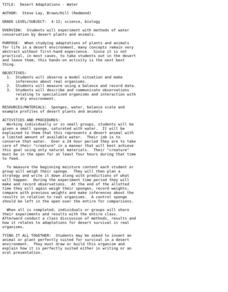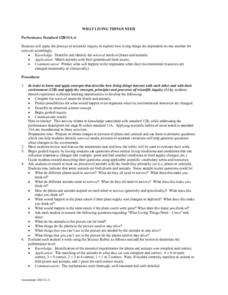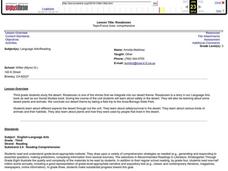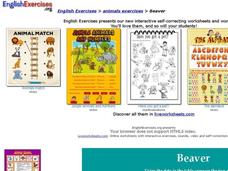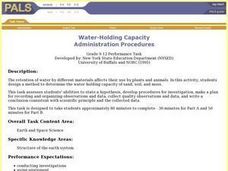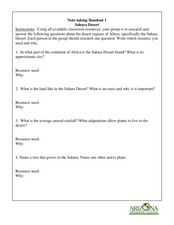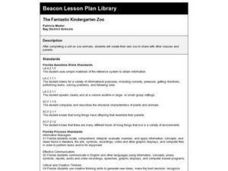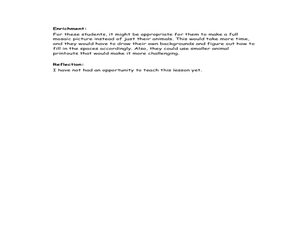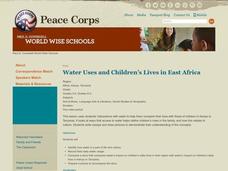Curated OER
Seahawk Educational & Environmental Discovery Program
Students identify and describe local poisonous plant/animals. They compare characteristics of three local ecosystems and describe common plants from different ecosystems; comparing shapes, colors, textures, and measuring sizes.
Curated OER
Climate Watch
Pupils participate in a national survey of biological indicators of climate change by gathering and submitting data on local plants and animals.
Curated OER
Desert Adaptations: Water
Learners experiment with methods of water conservation. For this water conservation lesson, students explore the importance of water for plants and animals in a desert biome.
Curated OER
What Living Things Need
Students apply the process of scientific inquiry to explore how living things are dependent on one another for survival. They match animals with their generalized food source. Students predict what happens to the organisms when their...
Curated OER
"Julie of the Wolves"
Fifth graders research life in Alaska and compare life there to their lives in this instructional activity. They read "Julie of the Wolves." They research through the novel and other reference books facts about the Alaskan climate and...
Curated OER
Pio, Pio, Que Frio
Students investigate the characteristics of living things. They determine that different organisms have different needs and describe and compare them. They draw and verbally respond about their favorite animal.
Curated OER
Respect the Beach
Students work together to compare and contrast sand particles. They identify what sand grains are composed of as well. They complete writing activities to complete the lesson.
Curated OER
The Edge of Home
Students explain why some species of plants and animals occur in more than one area. They watch as the teacher puts an overlapping circles on the chalkboard, students are asked to predict what kinds of things they would expect to find in...
Curated OER
Plankton
Students research phytoplankton and zooplankton. In this food chain lesson, students read This is the Sea That Feeds Us and discuss plankton, food chains, and webs. Students define phytoplankton and compare them to land plants. Students...
Curated OER
Roxaboxen
Third graders discuss the story "Roxaboxen." In this reading comprehension lesson, 3rd graders discover new vocabulary words, discuss the story using story mapping, and take a reading test. Students investigate safety in the desert and...
Curated OER
VERTEBRATES
Seventh graders describe the main characteristics of warm-blooded vertebrate animals. They compare and contrast the two different groups of warm-blooded vertebrate animals by looking at external, reproductive, and growth characteristics.
Curated OER
Mammal Characteristics
For this mammal characteristics, students study diagrams to compare the different types of teeth found in herbivores and carnivores. This worksheet has 1 short answer and 2 multiple choice questions.
Curated OER
ESL: Beaver Activity
In this ESL beaver worksheet, students read a chart comparing the American and European beavers, then fill in blanks in text about facts in the chart.
Curated OER
Seasons
Students name the 4 seasons, discussing the weather, plant life, animal life and and activities of each. Students read the book titled, "Hello Arctic," and and discuss changes in seasons that accompany the story. Students complete...
Curated OER
How Far Away is a Tropial Rainforest?
Students explore how far a rainforest is from their home. In this rainforest lesson students examine how far they live away from the rainforest. Students use the length of their school day to compare how long it will take to travel to...
Curated OER
Colors of Wildlife
Students observe wildlife animals. In this wildlife lesson, students cut out three different animals from a wildlife magazine. Then they compare the animals, verbally stating their similarities and differences.
Curated OER
Surrealism
Seventh graders research several surrealist artists, e.g. Dali, Magritte, etc., and analyze and compare their styles. They apply their knowledge to their own drawings in pastel of flowers and plants.
Curated OER
Dinosaurs 2: What Were Dinosaurs Like?
Students compare and contrast dinosaurs to animals that are alive today through basic research.
Curated OER
Send Me A Postcard From The Rainforest
Students research the different regions of the rainforest by using the Internet. They create their own postcards from each region they examine showing the plants and animals of that region. They share their postcards with the class.
Curated OER
Water-Holding Capacity
Students design and conduct an experiment to compare the water-holding capacity of sand, soil, and moss. They measure the change in weight for each material after adding the same amount of water to each material.
Curated OER
Note-Taking Handout 1: Sahara Desert
In this research skills activity, students collect information about the desert regions, savanna regions, and rainforest regions of Africa and then respond to 7 questions about each of the regions. Students then compare the regions using...
Curated OER
The Fantastic Kindergarten Zoo
First graders create their own zoo to share with other classes and parents. Groups create displays for the animals. Have each group brainstorm how they create a display for their animal.
Curated OER
Art Lesson Synthesis
Students observe animals and complete an art project. In this interdisciplinary lesson, students define the word mosaic, create animal mosaics, and share their creations with the class. As students explain their art to the class they...
Curated OER
Water Uses and Children's Lives in East Africa
Learners identify how water use is part of life and culture. Students record their daily water usage and compare results with classmates. Learners complete the graphic organizer on water and children. Students compose an essay, which...




